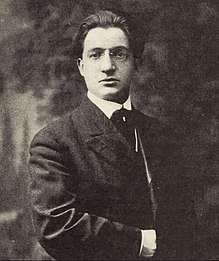Cesare Sodero
Cesare Sodero (August 2, 1886 – December 16, 1947) was an Italian conductor who spent much of his career working in the United States.

Biography
Born in Naples, Sodero studied with Giuseppe Martucci, and graduated from the Naples Conservatory at fourteen. He toured Europe for a short time as a cellist before coming to the United States in 1906; for seven years he directed various American opera companies, including that in Chicago, and tried to promote American interest in Italian symphonic music. In 1914 he became principal conductor at the New York Recording Department of Thomas A. Edison, Inc., formerly the Edison Phonograph Company. He contracted and conducted a wide variety of instrumental ensembles for Edison, principally focussing on band and orchestra selections. Alone of the musicians at Edison, Sodero had final say on repertoire he recorded, rather than Thomas Edison, and Sodero's instrumental recordings are some of the most colorful and imaginative of the entire acoustical recording era. Sodero also conducted the accompaniments for most of the operatic records made at Edison between 1915 and 1925, working with such luminaries as tenor Jacques Urlus and soprano Claudia Muzio. Sodero remained with Edison until 1925, when he turned to radio. He achieved significance as a pioneer in the broadcast of opera, directing a series of fifty-three works in tabloid form for NBC in 1926. From then until 1934 he also conducted several hundred symphonic concerts for the network; he then became music director for the Mutual network. From 1934 to 1942 he served as the conductor of the Mendelssohn Glee Club of New York. Having worked for most of his career in the relatively "invisible" fields of recording and radio, Sodero was surprisingly appointed as the principal conductor of the Metropolitan Opera's Italian wing in 1942 on account of Ettore Panizza's deciding to remain in Argentina after the United States' entry into World War II.[1] Sodero's Met debut, Aida on November 28, was highly successful, and critics praised Sodero's precise, powerful, yet lyrical direction. He worked steadily and successfully with the company until his death.
Sodero also composed music, and wrote one opera during his career. Titled Ombre Russe, it was given its premiere by NBC in 1929; the stage premiere took place in Venice in 1930.
Sodero died in New York City in 1947.
References
- Jackson, Paul (1992). Saturday Afternoons at the Met. Portland, Oregon: Amadeus Press. ISBN 0-931340-48-9.
- David Ewen, Encyclopedia of the Opera
External links
Works by Sodero's Band at Project Gutenberg (audio recordings)